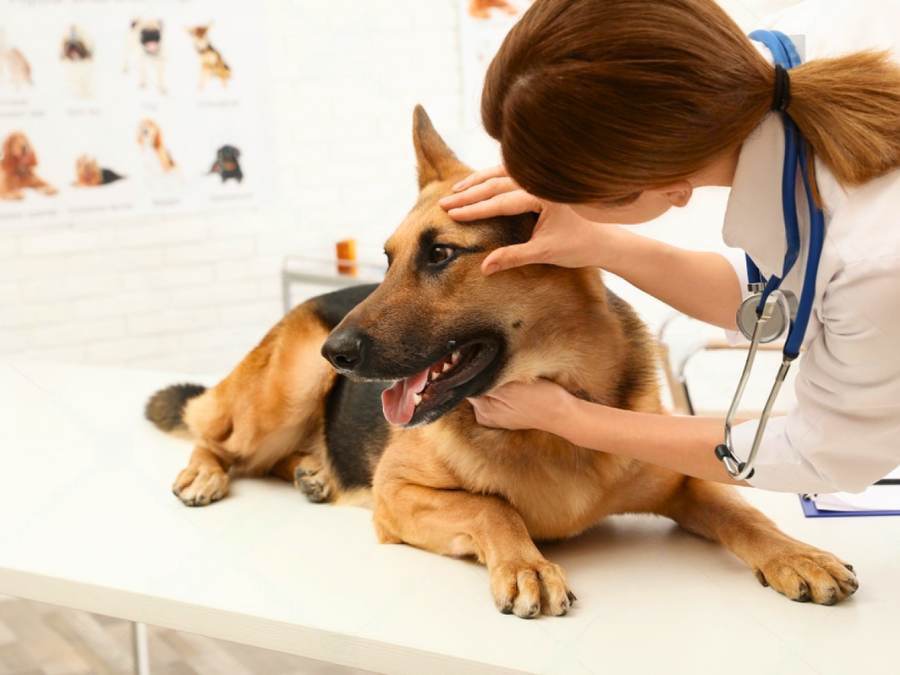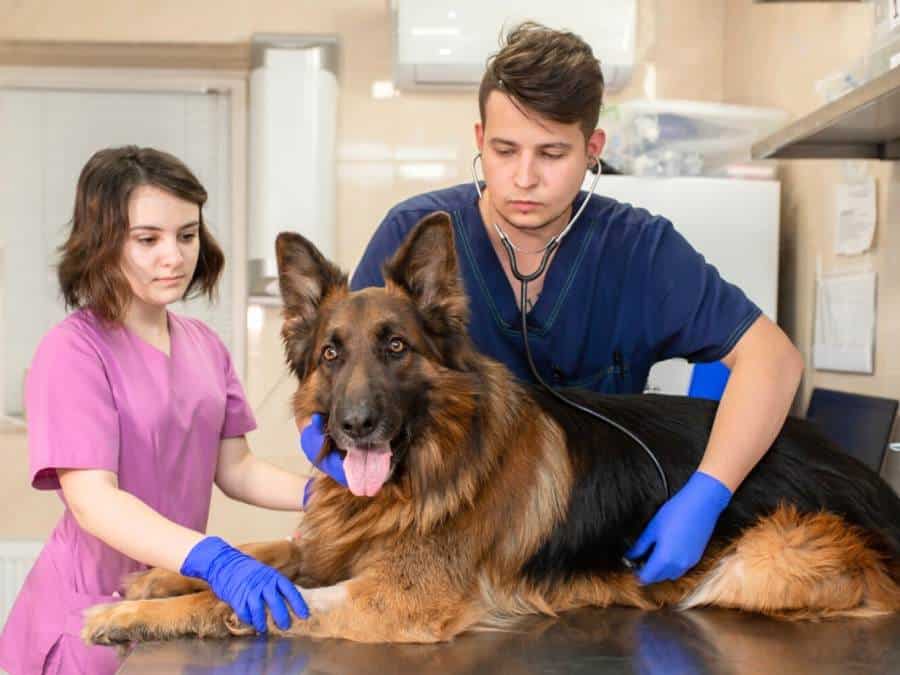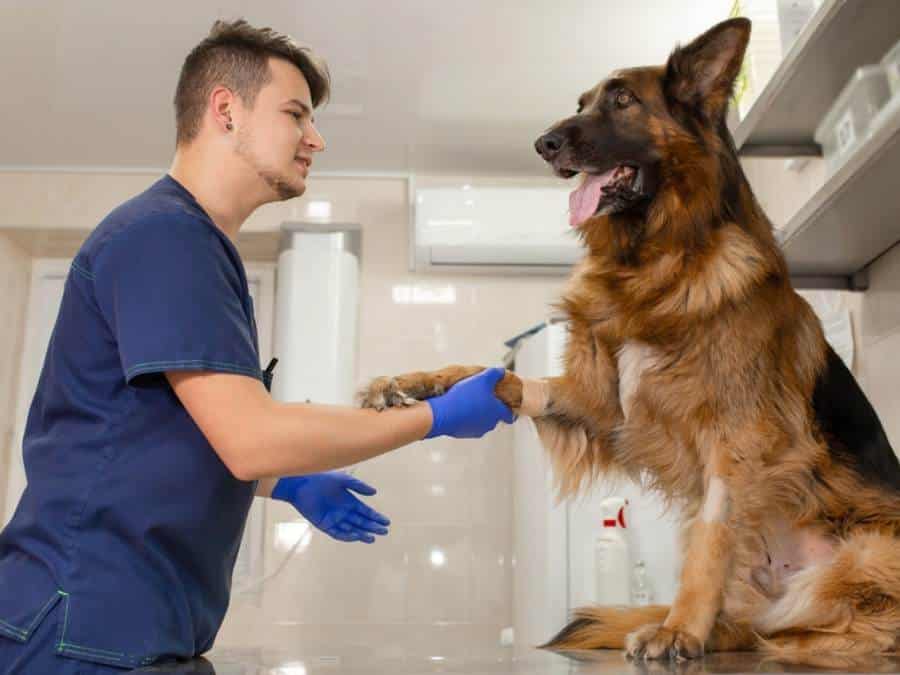An eye infection can not only cause discomfort and pain to your German Shepherd but can also signal underlying health issues.
This blog post offers you a comprehensive guide to understanding, preventing, and treating this common ailment. By keeping informed, you can ensure your German Shepherd’s eyes remain as expressive and bright as the day you first met.
Types of German Shepherd Eye Infections
German Shepherd eye infections can vary significantly in type and severity, affecting different parts of the eye. Here’s a look at some of the most common infections:
- Conjunctivitis: Also known as pink eye, this infection inflames the eye’s outer membrane, leading to redness, itching, and discharge.
- Keratitis: An infection of the cornea, the clear front layer of the eye, which can cause cloudiness and vision problems.
- Uveitis: This is the inflammation of the uvea, the middle layer of the eye, and can be a sign of serious health issues.
Each of these infections can have a profound impact on your dog’s comfort and vision, underscoring the need for prompt attention and care.

Symptoms of German Shepherd Eye Infection
Recognizing the symptoms early can help ensure prompt treatment and reduce discomfort. Here are common symptoms of eye infections in German Shepherds:
- Redness: The whites of your dog’s eyes may appear redder than usual, indicating irritation or inflammation.
- Discharge: You might notice a clear, yellow, green, or even pus-like discharge coming from your dog’s eyes. The nature of the discharge can vary depending on the cause of the infection.
- Swelling: The eyelids or the area around the eye may swell, sometimes significantly, if the infection is severe.
- Squinting or Blinking: German Shepherds with eye infections may squint or blink excessively. They might also keep the affected eye partially or completely closed.
- Rubbing or Scratching: An infected eye is often itchy and uncomfortable, leading dogs to rub or scratch at it, which can further irritate the area.
- Cloudiness or Change in Eye Color: In some cases, an infection can cause the eye to look cloudy or alter its color.
- Sensitivity to Light: German Shepherds with eye infections may become more sensitive to light and may seek out darker areas to avoid bright light.
- Vision Problems: While harder to directly observe, an infection can impair vision, which may be noticeable through changes in your dog’s behavior or mobility.
Don’t attempt to treat your German Shepherd’s eye infection on your own with human medications or with medications previously prescribed to your dog. It’s important to consult a veterinarian if you suspect your dog has an eye infection.
A professional can provide an accurate diagnosis and appropriate treatment, which may include antibiotic drops, ointments, or other medications depending on the cause and severity of the infection.
RELATED: German Shepherd Eye Problems: Signs & Treatment

What Causes Eye Infections in German Shepherds?
German Shepherd eye infections can be caused by a variety of factors, each leading to discomfort and potential complications if not treated properly.
Here are some common causes of eye infections in German Shepherds:
- Bacteria: Bacterial infections are a frequent cause of eye infections in German Shepherds. These can occur when bacteria enter the eye through injury, exposure to contaminated water or substances, or as a secondary infection to an underlying condition.
- Viruses: Viral infections, such as those caused by the canine distemper virus, can lead to eye infections. Viral infections often require supportive care and management of symptoms, as antibiotics are not effective against viruses.
- Fungi: Fungal infections in the eye are less common but can occur, particularly in dogs with compromised immune systems or those exposed to environments with high fungal loads.
- Parasites: Certain parasites can cause eye infections or conditions that affect the eye, including Thelazia callipaeda (eyeworm), which is transmitted by fruit flies.
- Allergies: Allergic reactions can cause inflammation and discomfort in the eyes, leading to symptoms similar to those of infections. Allergies may be triggered by pollen, dust, mold, or ingredients in food.
- Foreign Bodies: Sand, dirt, or other foreign objects can get into a dog’s eye, causing irritation, injury, and infection. Dogs that roam in thick vegetation or play in dusty areas are particularly at risk.
- Trauma: Injuries to the eye, such as scratches or punctures, can introduce bacteria or other pathogens, leading to infection.
- Tear Duct Issues: Problems with the tear ducts, including blockages, can prevent proper drainage of tears, leading to moisture build-up and potential infection.
- Underlying Health Conditions: Dogs with certain chronic health issues, such as diabetes or immune system disorders, may be more prone to developing eye infections due to their reduced ability to fight off pathogens.
- Poor Hygiene: Lack of regular cleaning, especially in breeds with pronounced facial folds or long hair that can irritate the eyes, can contribute to the development of eye infections.
Preventing eye infections in German Shepherds involves maintaining good hygiene, protecting them from environmental hazards, and ensuring they are up-to-date with vaccinations to prevent viral infections.
How to Differentiate Between Eye Allergies and Infections
While eye infections and allergies can present with similar symptoms, such as redness, itching, and discharge, there are key differences that can help pet owners distinguish between the two conditions:
- Allergy Symptoms: Allergies often affect both eyes simultaneously and are accompanied by signs of general allergies, such as sneezing, nasal discharge, and skin itchiness. The discharge from allergic reactions is typically clear and watery.
- Infection Symptoms: Infections can affect one or both eyes and are more likely to produce thick, colored eye discharge (green, yellow, or bloody). Infected eyes might also exhibit more severe swelling, pain, and sensitivity to light compared to allergic reactions.
Identifying the Cause
- Environmental Triggers: Eye allergies are often triggered by environmental factors like pollen, dust, mold, or smoke. If symptoms worsen after exposure to potential allergens, allergies might be the culprit.
- Recent Injury or Illness: An eye infection may follow a recent injury to the eye or a respiratory infection, indicating a bacterial or viral cause.
Regardless of whether symptoms suggest an allergy or an infection, consulting with a veterinarian is essential. They can provide a definitive diagnosis and recommend the best treatment plan.

How To Treat German Shepherd Eye Infection
Treating a German Shepherd’s eye infection effectively depends on accurately identifying the cause of the infection.
A veterinarian will typically conduct a thorough examination, which may include tests to identify the specific pathogens involved.
Treatment varies based on the underlying cause and severity of the infection but often includes one or more of the following approaches:
- Antibiotic Eye Drops or Ointments: For bacterial infections, antibiotics are the primary treatment. These may be applied directly to the eye in the form of drops or ointments to fight the bacteria causing the infection.
- Steroid Eye Drops: If there’s significant inflammation, steroid eye drops may be prescribed to reduce swelling and discomfort. However, these are used with caution and under strict veterinary supervision to avoid potential side effects, especially if the infection is fungal in nature.
- Antifungal Medications: For fungal infections, antifungal treatments either in the form of drops, ointments, or systemic medication may be necessary.
- Antiviral Medications: Viral eye infections may require antiviral medications. These can be topical or systemic, depending on the severity and type of virus.
- Washing and Cleaning: Gently cleaning the affected eye(s) to remove any discharge or crust that has formed is often recommended. Saline solution or a special eye cleaning solution recommended by your vet can be used for this purpose.
- Artificial Tears: To help soothe the eye and keep it moist, artificial tear drops might be suggested, especially if the dog has a condition that affects tear production.
- Removal of Foreign Bodies: If the infection is caused by a foreign object in the eye, the vet will need to remove it. Sedation may be necessary for this procedure.
- Treatment of Underlying Conditions: If the eye infection is a symptom of another health issue, such as diabetes or an immune disorder, managing the underlying condition is a crucial part of the treatment process.
- Surgery: In rare cases, surgical intervention may be necessary, especially if there are structural problems contributing to the infection or if severe damage has occurred.
- Warm Compresses: Applying a warm compress to the eye can help relieve discomfort and reduce swelling. This should be done gently and with clean materials to avoid further irritation.
It’s important to follow the veterinarian’s instructions closely and complete the full course of any prescribed treatment, even if the symptoms appear to resolve before the medication is finished.
Never use over-the-counter medications or treatments intended for humans without consulting a vet, as some substances can be harmful to dogs.
RELATED: German Shepherd Pannus: Symptoms and Treatment

Preventing German Shepherd Eye Infections
Prevention is key when it comes to German Shepherd eye infections. Here are several strategies to help keep your dog’s eyes healthy:
- Regular Cleaning: Gently wipe away any buildup around your German Shepherd’s eyes with a soft, damp cloth. Use a separate cloth for each eye to prevent cross-contamination.
- Protective Gear: When taking your dog to potentially irritating environments (e.g., windy or sandy areas), consider using protective eyewear designed for dogs.
- Avoid Irritants: Be mindful of household cleaners and sprays, ensuring your German Shepherd’s eyes are protected from potentially harmful chemicals.
- Regular Vet Check-ups: Annual or bi-annual vet visits can help catch and prevent eye issues before they become serious.
By incorporating these practices into your routine, you can significantly reduce the risk of eye infections in your German Shepherd.
Final Remarks
German Shepherd eye infections, while common, can be a source of significant discomfort for your furry friend. By staying informed about the types, causes, symptoms, and treatments of these infections, you can play a crucial role in safeguarding your dog’s eye health.
Remember, early recognition and prompt treatment are key to preventing long-term issues. As pet owners, our vigilant care and attention can ensure our dogs’ eyes remain as healthy and expressive as ever.
FURTHER READING:




